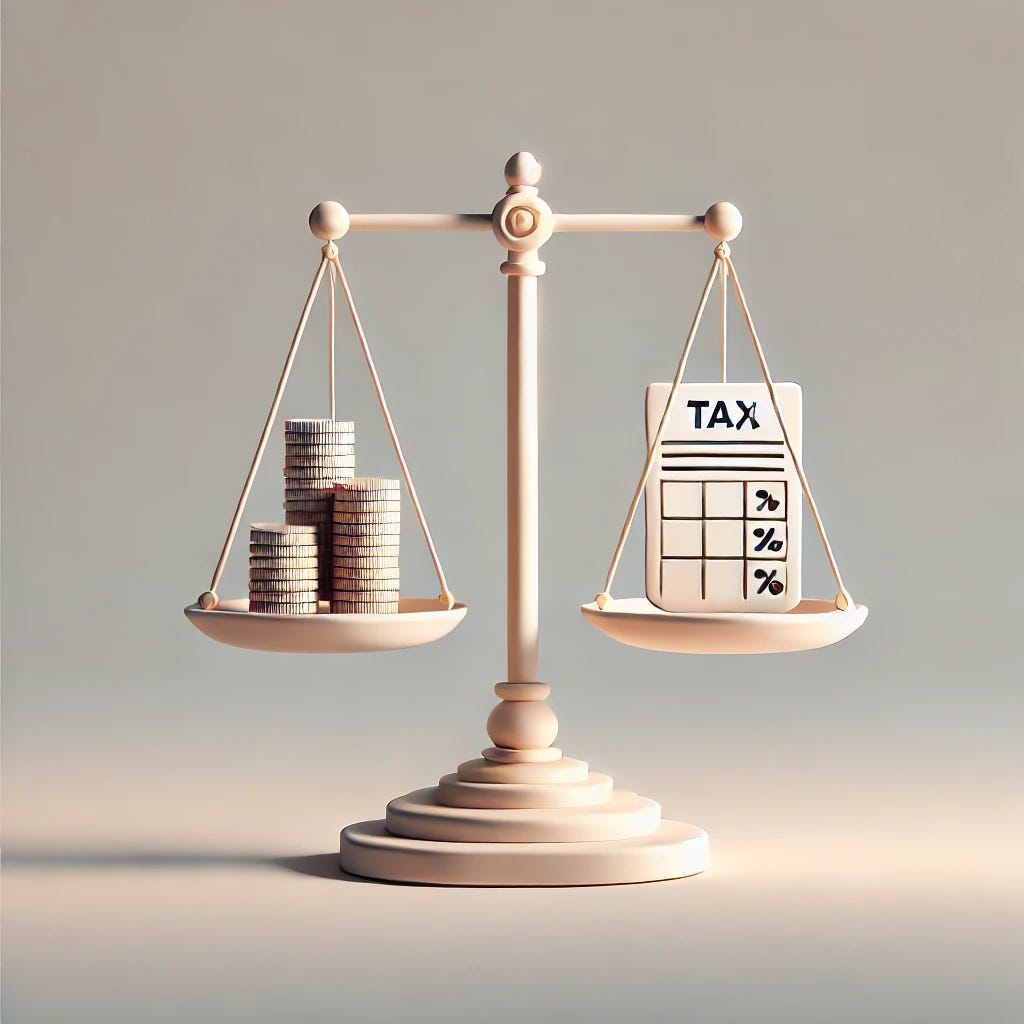294. SALT Tax, Nuclear Race, Property Tax Solutions | This Week's Economy Ep. 80
Key insights on tax reform, energy competition, and election issues.
Hello Friends!
In episode 80 of This Week's Economy, I discuss the SALT tax deduction problems, California’s social media law concerns, nuclear power race with China, VP debate challenges, presidential candidates miss pro-growth policies, and Texas can eliminate property taxes. Watch the episode on YouTube below, listen to it on Apple Podcast or Spotify, and visit my website for more information.
1. TRUMP SALT CAP TAX PROBLEM
In the News: Trump has proposed reversing the very same $10,000 cap on state and local tax (SALT) deduction cap he once signed into law. He suggested that eliminating the cap would financially relieve millions of Americans, especially in high-tax states. However, critics argue that removing the cap could disproportionately benefit wealthier taxpayers and would increase the overall cost of the 2017 tax reforms. Source: CBS News
My Take:
Bad Policy: Returning to the full federal subsidy of big government state and local spending policies from lower spending state and local governments with taxpayer money is a bad idea.
Encouraging Fiscal Responsibility at the State Level: SALT deduction cap incentivized high-tax states to become more fiscally responsible. Reversing the cap would relieve pressure on states like New York and California to control their tax rates and spending, potentially allowing them to continue unsustainable fiscal practices that burden their residents and the broader economy.
Solution: Lawmakers should end SALT. Taxpayers should bear the burden of their state and local taxes that fund spending instead of having them reduced by the federal tax code thereby incentivizing more excessive spending and a growing budget deficit.
2. CALIFORNIA SOCIAL MEDIA LAW CONCERNS
In the News: California’s Governor Newsom signed the Protecting Our Kids from Social Media Addiction Act. The bill makes it illegal for online services and apps to show minors an “addictive feed,” without parental consent or unless they do not know the user is underage. Source: CNN
My Take:
Unintended Consequences: While intended to protect minors from becoming addicted to social media, these types of regulations undermine the role of parents. Rather than empowering parents to guide their kids' online usage, such mandates shift that responsibility to the government and tech companies, reducing parental autonomy over family dynamics.
Privacy and Data Concerns: The bill requires platforms to implement measures such as default privacy settings and restrictions on sending notifications during certain hours. This incentivizes platforms to collect more personal data to verify users’ ages, inadvertently posing a risk to privacy rights and possibly making platforms more invasive, rather than less.
Economic Impact and Innovation: This law tech companies from developing new features or products that enhance user experience. California is home to major tech firms, and such restrictions might deter future investments or lead to costly compliance efforts that harm the local economy and innovation ecosystem. See my latest article on why banning TikTok threatens liberty and innovation at
.
3. NUCLEAR POWER RACE WITH CHINA
In the News: US companies and industry experts are worried America is behind in the race to master nuclear energy. China is outspending and perhaps outpacing the U.S. in developing this clean energy as new fusion companies pop up nationwide. Source: CNN
My Take:
Key Part of Energy Future: The United States’ private sector should be investing in nuclear power as a major part of our energy future. This will provide Americans with an energy future that is not only clean, affordable, and reliable, but also powers their lives and their potential for flourishing.
Texas’s Role: Texas has a bright path forward with the potential for expanding nuclear energy, providing a solid energy mix through market forces, not government planning. Nuclear power has led to reliable and sustainable power for the state in the face of devastating conditions.
Solutions to Encouraging Nuclear Power: Add in safety enhancements and efficient waste recycling, nuclear energy offers a sustainable way forward. Governments should remove barriers for development of nuclear energy and other energy sources so that markets provide the best mix of energy production
4. VICE PRESIDENTIAL DEBATE CHALLENGES
In the News: The Vice Presidential candidates are set to debate on October 1, with preparations already underway. Fox News reports that JD Vance uses the media to sharpen his debate skills. Source: Fox News
My Take:
Economic Freedom: As the candidates prepare for this pivotal debate, the state of the U.S. economy will undoubtedly be a focal point. JD Vance has aligned himself with the “New Right,” which often opposes critical pro-growth policies historically supporting economic improvement. Tim Walz backs policies championed by Kamala Harris that can undermine businesses, including higher corporate tax rates and tax exemptions for select groups, creating a disincentive for growth.
Populism in Both Campaigns: Both candidates leverage populist rhetoric to attract voters. Instead, they must advocate for policies rooted in sound economic principles. Effective governance requires a commitment to foundational economic strategies.
A Better Path: The candidates should emphasize reducing regulations, promoting innovation, and embracing free trade. By cutting government spending, lowering taxes, and streamlining regulations, we can unleash economic potential and foster prosperity for all.
5. PRESIDENTIAL CANDIDATES MISS PRO-GROWTH POLICIES
In the News: More than 400 economists and former high-ranking policymakers endorse Kamala Harris and her vision for the economy. The document says: “The choice in this election is clear: between failed trickle-down economic policies that benefit the few and economic policies that provide opportunity for all...” Meanwhile, Trump warns of economic harm if he is not elected. He states tariffs are his game plan for helping the economy. Source: CNN, The Hill, CNN
My Take:
Both Candidates Miss the Mark: Trump and Harris both fail to address the key issues needed to improve our economy and help Americans thrive. They overlook the root causes of inflation, such as excessive government spending and the Fed’s bloated balance sheet.
Tariffs & Taxes: Both candidates proposed tax incentives to attract voters but seem unaware of the long-term consequences of narrowing the tax base. Harris advocates for raising taxes on businesses, which could stifle investment, innovation, job opportunities, and economic growth. Meanwhile, Trump favors increasing tariffs—essentially taxes paid by consumers—as a primary foreign policy tool, which will also burden American households.
Best Economic Remedy: The ideal solution is for a leader to recognize the dangers of overspending. By cutting government spending, lowering taxes, and streamlining regulations, we can unleash economic growth and foster prosperity for all Americans.
6. TEXAS’ PROPERTY TAX RELIEF FAILURES
In the News: The Texas House Select Committee on Sustainable Property Tax Relief held a hearing on September 26. I wasn’t able to attend because of a prior commitment, but I submitted written testimony. While there is disagreement over how it should happen, Texas can eliminate property taxes. Source: Texas Legislature.
My Take:
Texas has a Spending Problem: Over the last decade, the Texas Legislature has made some progress in providing property tax relief, but the housing affordability crisis demands more action. The 2023 legislative session allocated $12.7 billion for property tax relief despite a $32.7 billion budget surplus, but the relief barely impacted property taxes due to increased local government spending. The property tax system, which acts as an unrealized capital gains tax, forces Texans to perpetually rent from the government, making it difficult for families to build and pass on wealth.
Property Taxes Are Immoral: Property taxes function as an annual wealth tax that forces Texans to rent their homes from the government. This makes it difficult for families to build or pass on a financial legacy and should be eliminated.
Simple Steps to Eliminate Property Taxes: Texas should cap property taxes at the no-new-revenue rate, pass strong spending limit that covers state and local spending at a maximum of population growth plus inflation, and allocate at least 90% of state surpluses to compress school district M&O property tax rates until they are eliminated while local governments cut their property tax rates with surpluses to zero. This CPA (cap, pass, allocate) approach would help curb rising taxes and pave the way for a more prosperous future free from property taxes.
Conclusion
Thanks for joining me in this episode of "This Week's Economy." For more insights, visit vanceginn.com and get a paid subscription to my Substack newsletter at vanceginn.substack.com today so you receive these insights in your inbox. God bless you, and let people prosper.
Keep reading with a 7-day free trial
Subscribe to Let People Prosper to keep reading this post and get 7 days of free access to the full post archives.








